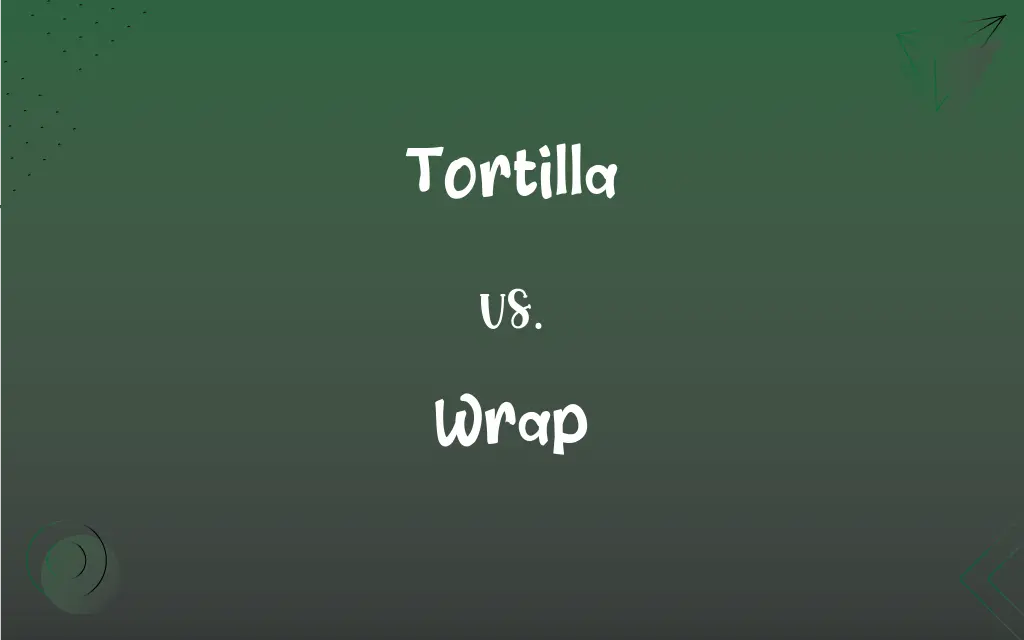Tortilla vs. Wrap: What's the Difference?
Edited by Janet White || By Harlon Moss || Updated on November 25, 2023
A tortilla is a thin, flat, unleavened bread made primarily from corn or wheat, while a wrap refers to a sandwich or meal rolled in a soft flatbread, which could be a tortilla.

Key Differences
A tortilla and wrap, both popular in various cuisines, have distinct identities. Tortilla, with its roots in Mesoamerican culture, is traditionally a flatbread made from finely ground maize (corn) or wheat. These tortillas serve as the base for numerous dishes like tacos, quesadillas, and enchiladas.
On the other hand, the term wrap generally refers to a culinary dish where various fillings, often including proteins, vegetables, and sauces, are enclosed within a soft flatbread. This flatbread can, in fact, be a tortilla, but it can also be other kinds of bread, like lavash or pita.
When discussing texture and preparation, tortillas are typically thinner and are cooked briefly on a griddle or stovetop. They have a specific texture that holds fillings well and can be slightly crispy or soft. Wraps, being a broader term, vary in texture based on the type of flatbread used.
From a cultural standpoint, while tortillas are integral to Mexican and Central American cuisines, the concept of a wrap is more global. Wraps can be found in various cultures, encompassing a range of flavors, fillings, and types of breads.
Comparison Chart
Origin
Mesoamerican cultures.
Global concept.
ADVERTISEMENT
Primary Ingredient
Maize (corn) or wheat.
Varies, often includes meat, vegetables, sauces.
Function
Serves as a base for dishes.
Encloses various fillings.
Texture
Typically thin and soft, can be crispy.
Depends on the type of flatbread used.
Cultural Significance
Central to Mexican and Central American cuisines.
Found in many global cuisines.
Tortilla and Wrap Definitions
Tortilla
An unleavened bread that comes in various sizes.
I prefer the smaller tortilla size for making street tacos.
ADVERTISEMENT
Wrap
A sandwich or meal rolled within a soft flatbread.
I ordered a chicken Caesar salad wrap for lunch.
Tortilla
An essential component of many Mexican dishes.
We filled the tortilla with cheese and folded it to make a quesadilla.
Wrap
A versatile dish that caters to many dietary preferences.
They offer a vegan wrap with plant-based protein and fresh veggies.
Tortilla
A thin flatbread made primarily from corn or wheat.
I used a corn tortilla to make the taco.
Wrap
Often consumed as a portable, handheld meal.
The wrap was convenient for my on-the-go lunch.
Tortilla
A versatile base that can be used for wrapping or layering.
We layered the tortillas with beans and cheese for the casserole.
Wrap
A global dish comprising various fillings enclosed in bread.
The Mediterranean wrap had hummus, falafel, and veggies.
Tortilla
A circular bread that's cooked on a griddle.
The smell of a freshly cooked tortilla is irresistible.
Wrap
Can use a variety of bread types, including tortillas.
The restaurant offers wraps using spinach or tomato tortillas.
Tortilla
A thin disk of unleavened bread made from masa or wheat flour and baked on a hot surface.
Wrap
To arrange or fold (something) about as cover or protection
She wrapped her fur coat closely about herself.
Tortilla
(Mexican cuisine) A flat round bread made out of cornmeal or flour.
Wrap
To cover, envelop, or encase, as by folding or coiling something about
Wrapped my head in a scarf.
Tortilla
(Spanish cuisine) Spanish omelette; an omelette containing potatoes and onions.
Tortilla
An unleavened cake, as of maize flour, baked on a heated iron or stone.
Tortilla
Thin unleavened pancake made from cornmeal or wheat flour
FAQs
Are wraps always served cold?
No, wraps can be served cold or heated, depending on the filling and preference.
What's a popular vegetarian filling for wraps?
Hummus, roasted veggies, and feta cheese are popular vegetarian wrap fillings.
What's the difference between a tortilla and a chapati?
While both are flatbreads, tortillas originate from Mesoamerica, and chapati is an Indian bread.
How do you keep tortillas soft?
Keeping them in a sealed container or tortilla warmer can help retain softness.
How long can I store tortillas?
Store-bought tortillas can be kept for about 7-10 days, while homemade ones are best consumed within 1-2 days.
Do tortillas always need to be round?
Traditionally, they are round, but they can be made in any shape.
Are wraps healthier than sandwiches?
It depends on the ingredients used; both can be healthy or indulgent.
What's the origin of the word "wrap"?
The term "wrap" in this context comes from the idea of wrapping or rolling fillings in bread.
Can wraps be considered a type of sandwich?
Some people consider them a type of sandwich due to the similar function, but they are typically rolled.
What makes a tortilla puff up while cooking?
Steam trapped inside causes the tortilla to puff during cooking.
Is every wrap made with a tortilla?
No, wraps can be made with various types of flatbreads, not just tortillas.
Can tortillas be gluten-free?
Yes, corn tortillas are naturally gluten-free.
Can I freeze tortillas?
Yes, tortillas can be frozen for later use.
What's the main difference between a tortilla and a crepe?
A tortilla is savory and made from corn or wheat, while a crepe is often sweet and made from a thin batter.
Can tortillas be made without any cooking oil?
Yes, especially when they're made from just masa (corn) and water.
Is a burrito a type of wrap?
Yes, a burrito is a type of wrap where the fillings are enclosed in a tortilla.
Do all wraps have a protein filling?
No, wraps can be filled with a variety of ingredients, including just vegetables or grains.
Are all tortillas soft?
Most tortillas are soft when freshly made, but they can become crispy when baked or fried.
Why are some wraps cut diagonally?
Cutting diagonally can make the wrap easier to eat and more visually appealing.
Can wraps be grilled?
Yes, some wraps are grilled to add flavor and texture.
About Author
Written by
Harlon MossHarlon is a seasoned quality moderator and accomplished content writer for Difference Wiki. An alumnus of the prestigious University of California, he earned his degree in Computer Science. Leveraging his academic background, Harlon brings a meticulous and informed perspective to his work, ensuring content accuracy and excellence.
Edited by
Janet WhiteJanet White has been an esteemed writer and blogger for Difference Wiki. Holding a Master's degree in Science and Medical Journalism from the prestigious Boston University, she has consistently demonstrated her expertise and passion for her field. When she's not immersed in her work, Janet relishes her time exercising, delving into a good book, and cherishing moments with friends and family.






































































